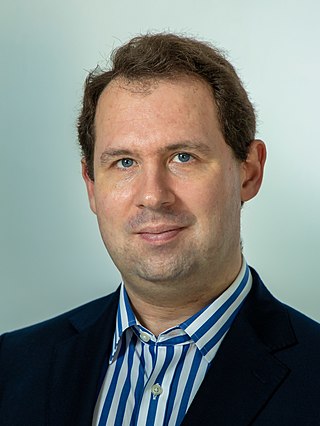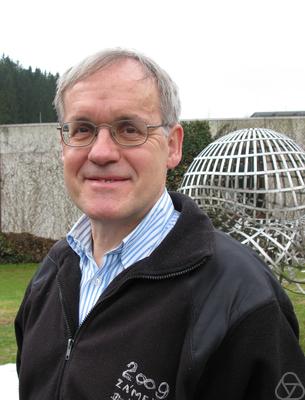
The Courant Institute of Mathematical Sciences is the mathematics research school of New York University (NYU), and is among the most prestigious mathematics schools and mathematical sciences research centers in the world. Founded in 1935, it is named after Richard Courant, one of the founders of the Courant Institute and also a mathematics professor at New York University from 1936 to 1972, and serves as a center for research and advanced training in computer science and mathematics. It is located on Gould Plaza next to the Stern School of Business and the economics department of the College of Arts and Science.

Fellowship of the American Association for the Advancement of Science (FAAAS) is an honor accorded by the American Association for the Advancement of Science (AAAS) to distinguished persons who are members of the Association. Fellows are elected annually by the AAAS Council for "efforts on behalf of the advancement of science or its applications [which] are scientifically or socially distinguished".

The L'Oréal-UNESCO For Women in Science Awards, created in 1998, aim to improve the position of women in science by recognizing outstanding women researchers who have contributed to scientific progress. The awards are a result of a partnership between the French cosmetics company L'Oréal and the United Nations Educational, Scientific and Cultural Organization (UNESCO) and carry a grant of $100,000 USD for each laureate. This award is also known as the L'Oréal-Helena Rubinstein Women in Science Awards.
Adam Dunkels is a Swedish computer scientist, computer programmer, entrepreneur, and founder of Thingsquare, an Internet of things (IoT) product development business.
The Sloan Research Fellowships are awarded annually by the Alfred P. Sloan Foundation since 1955 to "provide support and recognition to early-career scientists and scholars". This program is one of the oldest of its kind in the United States.

Nikos Paragios is a professor of Computer Science and Applied mathematics at CentraleSupélec, senior fellow at the Institut Universitaire de France and affiliated scientific leader at Inria while serving as the editor in chief of the Computer Vision and Image Understanding Journal of Elsevier Publishing House.
He holds a D.Sc. degree in electrical and computer engineering (2000) from Inria and the University of Nice Sophia Antipolis, and has held permanent positions at Siemens Corporate Technology, École des ponts ParisTech as well as visiting positions at Rutgers University, Yale University and University of Houston.

Informatics Europe is the European association of university departments and research laboratories, in the field of informatics.

Steven James Murdoch is Professor of Security Engineering in the Computer Science Department, University College London. His research covers privacy-enhancing technology, Internet censorship, and anonymous communication, in particular Tor. He is also known for discovering several vulnerabilities in the EMV bank chipcard payment system and for creating Tor Browser.

Alexander (Lex) Schrijver is a Dutch mathematician and computer scientist, a professor of discrete mathematics and optimization at the University of Amsterdam and a fellow at the Centrum Wiskunde & Informatica in Amsterdam. Since 1993 he has been co-editor in chief of the journal Combinatorica.
Robert David Kleinberg is an American theoretical computer scientist and professor of Computer Science at Cornell University.
Andrea Alù is an Italian American scientist and engineer, currently Einstein Professor of Physics at The City University of New York Graduate Center. He is known for his contributions to the fields of optics, photonics, plasmonics, and acoustics, most notably in the context of metamaterials and metasurfaces. He has co-authored over 650 journal papers and 35 book chapters, and he holds 11 U.S. patents.
Milan Vojnovic is a professor of data science with the Department of Statistics at the London School of Economics, where he is also director of the MSc Data Science Programme. Prior to this, he worked as a researcher with Microsoft Research from 2004 to 2016.
The College of Computer, Mathematical, and Natural Sciences (CMNS) at the University of Maryland, College Park, is home to ten academic departments and a dozen interdisciplinary research centers and institutes. CMNS is one of 13 schools and colleges within the University of Maryland, College Park.

Mohammad Taghi Hajiaghayi is a computer scientist known for his work in algorithms, game theory, social networks, network design, graph theory, and big data. He has over 200 publications with over 185 collaborators and 10 issued patents.
Alain Bensoussan, born on 12 May 1940 in Tunis, is a French mathematician. He is Professor Emeritus at the University of Paris-Dauphine and Professor at the University of Texas at Dallas.
Kristina Höök is a Swedish computer scientist specializing in human–computer interaction and known for her work in somaesthetics. She is a professor in interaction design at the KTH Royal Institute of Technology.

Matthias Grossglauser is a Swiss communication engineer. He is a professor of computer science at EPFL and co-director of the Information and Network Dynamics Laboratory (INDY) at EPFL's School of Computer and Communication Sciences School of Basic Sciences.








